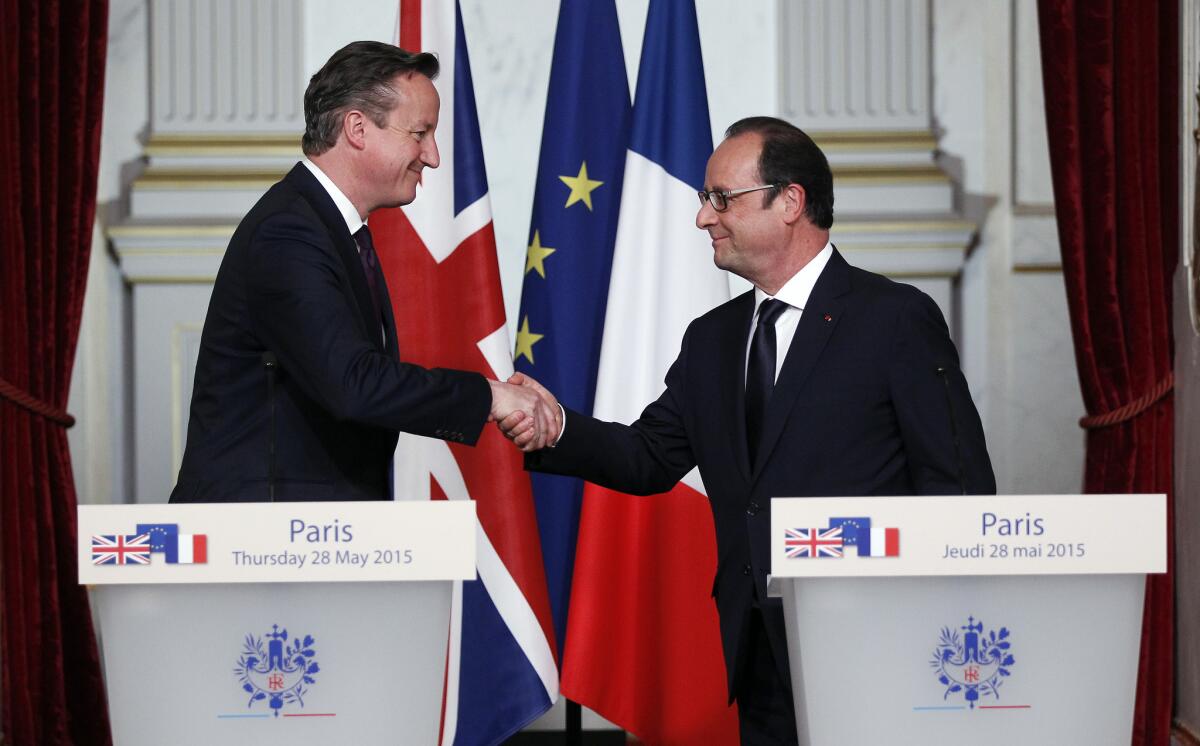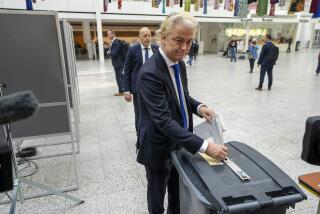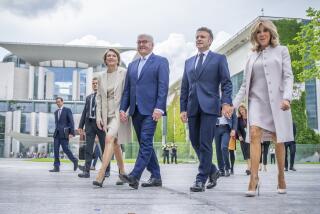Britain’s EU membership at heart of Cameron’s European tour

British Prime Minister David Cameron, left, shakes hands with French President Francois Hollande after a press conference at the Elysee Palace in Paris on Thursday.
- Share via
Reporting from London — Hot on the heels of his election victory, Prime Minister David Cameron embarked on a whirlwind two-day tour of Europe aimed at renegotiating Britain’s membership in the European Union.
Cameron met with leaders in Holland and France on Thursday and plans to travel to Poland and Germany on Friday as part of his campaign to secure “substantive” changes ahead of a referendum on whether the British public wants to stay in or leave the EU.
The meetings are unlikely to bring immediate results, yet they will provide a crucial litmus test of how open each country is to negotiation.
A referendum on Britain’s membership of the EU was one of Cameron’s key promises to voters who gave his Conservative Party a solid parliamentary victory earlier this month.
Foreign Secretary Philip Hammond said Cameron would warn the European leaders that the ballot initiative is not a matter to be taken lightly. Unless they agree to Cameron’s reforms, he said, the British public will likely vote to leave.
“We are confident that our counterparts in Europe understand the importance of this issue,” Hammond told reporters Thursday. “[And] understand that if these issues are not addressed the British people will not give their endorsement to the proposition that Britain should remain part of the European Union.”
The reforms Cameron is expected to be asking for include a limit on the number of EU migrants entering the U.K., and tougher rules for those already in Britain.
More specifically, the prime minister is reportedly looking to block unemployed EU migrants from claiming benefits, forcing them to wait four years before claiming in-work benefits.
Cameron will also try to gain Britain more powers to block new EU laws as well as an opt-out option from the EU’s commitment to “ever closer union.”
In 1973 Britain joined the bloc that now numbers 28 countries and while EU membership brings many benefits, including the creation of the world’s largest single market, it also requires adherence to European law, which has proved divisive, especially on issues of immigration, border control and human rights.
The right-wing U.K. Independence Party, which secured 13% of the votes in the election, made an exit from the EU one of its key campaign pledges and Cameron’s decision to give voters a choice on the issue was partly a way to win support among those enticed by the move to leave the EU.
A parliamentary bill published Thursday outlined details of the referendum and states it must be held by Dec. 31, 2017.
Voters will be asked the question: “Should the United Kingdom remain a member of the European Union?” meaning a “yes” vote will be a vote in favor of staying part of the EU.
This is a key difference from last year’s vote for Scottish independence where “yes” was a vote to break away.
Hammond has not ruled out that the vote could be held as early as next year, but stressed “it’s more important that we get it right than that we get it quickly.”
“We are absolutely determined to deliver on this agenda,” he added.
Cameron’s first stop on his whistle-stop tour was in Holland, where he had lunch with his counterpart, Dutch Prime Minister Mark Rutte.
As he arrived, Cameron told reporters that the focus of their discussions would be growth and jobs, and the need for flexibility.
He likened Britain’s relationship with Holland to “old friends and like-minded allies.”
Later in the afternoon, Cameron traveled to the Elysee Palace in Paris to meet with French President Francois Hollande.
On Friday he will meet Polish Prime Minister Ewa Kopacz in Warsaw and German Chancellor Angela Merkel in Berlin. The British government has been told by lawyers that reforms will require changes to EU treaties, a move that has been resisted by other leaders and could potentially open up the EU to a plethora of demands from member nations.
In a sign of the early opposition Cameron is likely to face in his meetings, French politician Christophe Premat told the BBC that the looming referendum could not be used “as a threat” in the negotiations.
“We respect that a referendum will be held in Great Britain, that’s the destiny of the people in the U.K. That’s correct. But, at the same time, we can’t use the referendum as a threat in order to have more space in the renegotiation,” he said. “The method should be approached in another way. That might be the message of President Hollande to David Cameron tonight.”
Boyle is a special correspondent.
More to Read
Sign up for Essential California
The most important California stories and recommendations in your inbox every morning.
You may occasionally receive promotional content from the Los Angeles Times.













